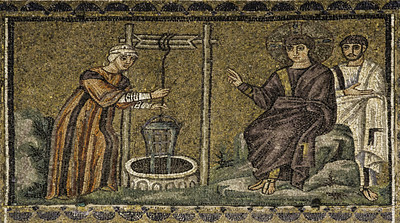THE SAMARITAN WOMAN
by Sr M. Jadwiga Swiatecka

If you are at all like me, you may well have forgotten by now what [last Sunday's] Gospel was about, so let me remind you: it was the story of the Samaritan woman. And isn’t St. Matthew a vivid story-teller? There’s Jesus sitting by the well, and the Samaritan woman coming with her drinking vessel, which he hasn’t got, and the ensuing conversation about different kinds of water, and she, all excited, running back to her village and telling all her neighbours about this extraordinary chap who seemed to know all about her; and they, full of curiosity, trooping out to see this phenomenon and being convinced by his – comparatively few – words that he was indeed something special…Surely, if there were ever anyone who should be a special patron saint of women preachers, it should be this, alas nameless, woman, whose very excitement it is which brings others to faith.
But what is it Jesus tells her which causes her initial excitement? She must, of course, have been surprised that this man should speak to her at all: as you know, it wasn’t proper for men to speak to strange women, though that kind of propriety did not seem to bother Jesus, who, it would seem, was prepared to talk to all and sundry: lepers, blind people, Syrophoenician women, centurions… , even the devil himself. Matthew’s gospel, after the first section which comprises the Beatitudes, and further directions for our way of life, is not unlike a list of all those with whom Jesus came into contact – and often with some conversation. But you will remember that what Jesus tells the Samaritan woman is that she has had five (FIVE!) husbands, and that the man she is living with now isn’t her husband at all. What I find both heartening and perhaps surprising in this exchange is Jesus’s tone of voice: I cannot see how, in the context, you can read it as a castigating and disparaging condemnation: it’s a fact, and there it is: Jesus, it seems to me, leaves it to her to acknowledge its truth.
If so, since Jesus does thus present the Samaritan woman with what the reality of her life has been, which she acknowledges as accurate, and since in the way he speaks he also implies that it wasn’t quite what it should have been, we can perhaps see it as a parallel to our own face to face meeting with our Lord when we die: we, too, will see our own lives under His scrutiny, which will be honest, but not condemnatory: after all, we have been given all the necessary resources to judge our own actions even now, and they may be as blatantly askew as this Samaritan woman’s five husbands. Lent, surely, provides us each year with opportunities to face truths about ourselves, much as we might well prefer not to.
And perhaps, also, it is this kind of water, the pure water of truth about herself, which is the water that Jesus is asking for from the Samaritan woman, and which he asks from us too. When she runs back to her village saying that this man had told her all about herself, she is surely admitting to her style of life, which, in a village, must have been well-known, if not, necessarily, acknowledged. This is often true in any circumstances: other people can tell us our faults more often than we will admit them ourselves. But in the case of the Samaritan woman her implied admission of her way – and wayward way - of life is the first step to the conversion of her neighbours, as perhaps it needs to be in our own case. Let us, then, pray for the self-knowledge that such recognition implies, and the courage, humility and self-forgetfulness that it demands, that we may become, like the Samaritan woman, though nameless, better women preachers.